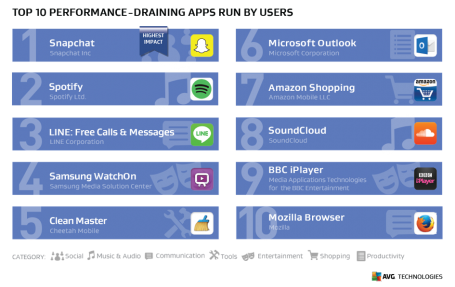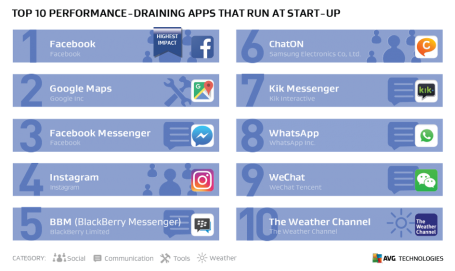Have unlimited storage, data, battery? Then resume cat videos. But if you get “storage full” messages just before your kid’s solo or a smartphone that dies before lunch, read on.
If you feel like your phone poops out every time you really need it, don’t worry—it’s not you.
We hate to break it to you, but … It’s your apps.
We know, you love them. But it might be time to … take a break, from at least a few.
How can you know, though, which ones are sucking your battery life at the speed of light, devouring your bandwidth, and hogging every inch of space on your Android? AVG’s latest Android App Performance & Trend Report lines up the worst of the worst … and points out who’s cleaned up their act.
By analyzing anonymized data from 3 million AVG AntiVirus for Android users, we’ve done the hard work for you, and now all you need to do to get the most from your phone’s resources is compare your app roster to the lists below (Get the full report).
Top 10 user-run performance-draining apps
This rogues’ gallery highlights those which overall have the highest impact, meaning a combination of all 3 factors: battery life, data use, and storage.

Notice anything? Spotify, Snapchat, and Outlook, apps that millions of people likely use every day, are in top spots. If you’re nowhere near a power outlet, our advice is simple: avoid using these apps for long periods of time. I myself notice that if I’m using Spotify, in particular, while browsing the web and checking email, that my Android barely makes it though a half-day before shutting down.
Snapchat’s top position was also no surprise. What was surprising was our discovery, during testing, that though the app appears to remove images and videos from conversations, Snapchat actually cached quite a few files. YouTube was also guilty of this, reaching 270 MB just after a couple of days.
Top 10 performance-draining apps that run at start-up

Tops spots are held by Facebook and Facebook Messenger, because they continuously check for updates and send notifications. Our advice: Uninstall Facebook apps and use your browser and the web version (www.facebook.com), instead. You may notice that manually checking your feed only when you need to can make all the difference … and not leave you with a useless phone.
The last word … for now
It’s almost funny how the performance of our pocket-sized smartphones has exceeded that of PCs considered high-end just 5 years ago. Yet we’re still bound by 16 and 32 GB built-in storage, data caps, and battery technology that hasn’t improved in ages. Until the smartphone world resolves these issues, we’ll keep on keeping you informed about how you can get the most from your devices, without missing out on what’s so vital (and fun!) about them in the first place.
![]()
![]()

